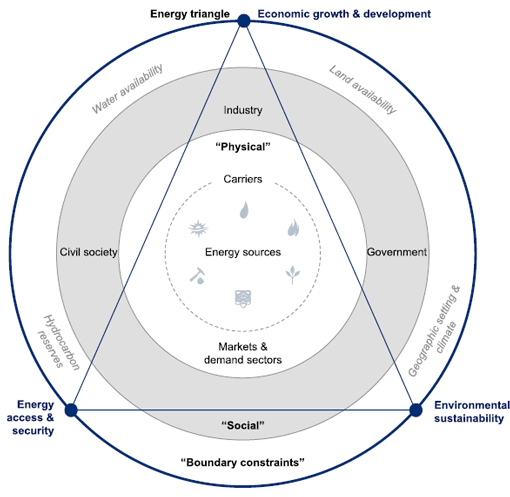World Economic Forum producerar en hel del nyttigt material om energifrågor. I någon mån förutsägbart och traditionellt eftersom resurserna i stort sett kommer från etablerade jätteföretag som ofta har en traditionell syn på att framtiden skall vara som gårdagen fast mera lönsam. Detta syns i lite grann i deras arbete med att klassificera länders energisystem ur säkerhetsaspekt. Där t.ex. Norge och Sverige kommer högt i listorna. Bedömningarna sammanfattas i ett “Energy Architecture Performance Index” som har en ambitiös modell som de kallar energitriangeln (se figur nedan).
Men de blir mera spännande när de börjar titta in i framtiden och diskuterar energiomställningar. Visserligen säger de redan från början att de inte tar effektivisering med i beräkningen på ett explicit sätt, men det beror inte på att de underkänner effektivisering utan erkänner att det hela blir komplext. Denna visionsskrift avslutas med insikten:
When we think about the possibility of the next energy transition, we typically think about how the transition might happen with all other things being equal. More efficient energy use and changes in how we power transport are certainly on the table, but with that comes a tendency to consider a world that looks very much like the one we live in today.
But that’s not how energy transitions have occurred in the past. The transitions from wood to coal to oil and the rise of electric power were accompanied by sweeping technological, sociological and economic changes. More concentrated energy sources enabled the industrial revolution and facilitated mass migration to cities. Electricity allowed the rise of appliances in the home and workplace, automating and simplifying many tasks and increasing productivity, and now enabling the digitization of the world.
Understanding the dynamics of energy transitions requires respect for innovation and its unexpected impact, and indeed some imagination about the future. Will the next transition be accompanied by larger changes in way of life? Or will it be mainly a change in how energy is produced and distributed? As to that, time will truly tell.
Där kan man hålla med om vartenda ord utom sista meningen. Som snarare borde lyda: “As to that we will truly work for a change towards sustainability based on efficiency and renewables”

Skriven av Hans Nilsson, 05:27 AM.
(0) Kommentarer • Permalink
